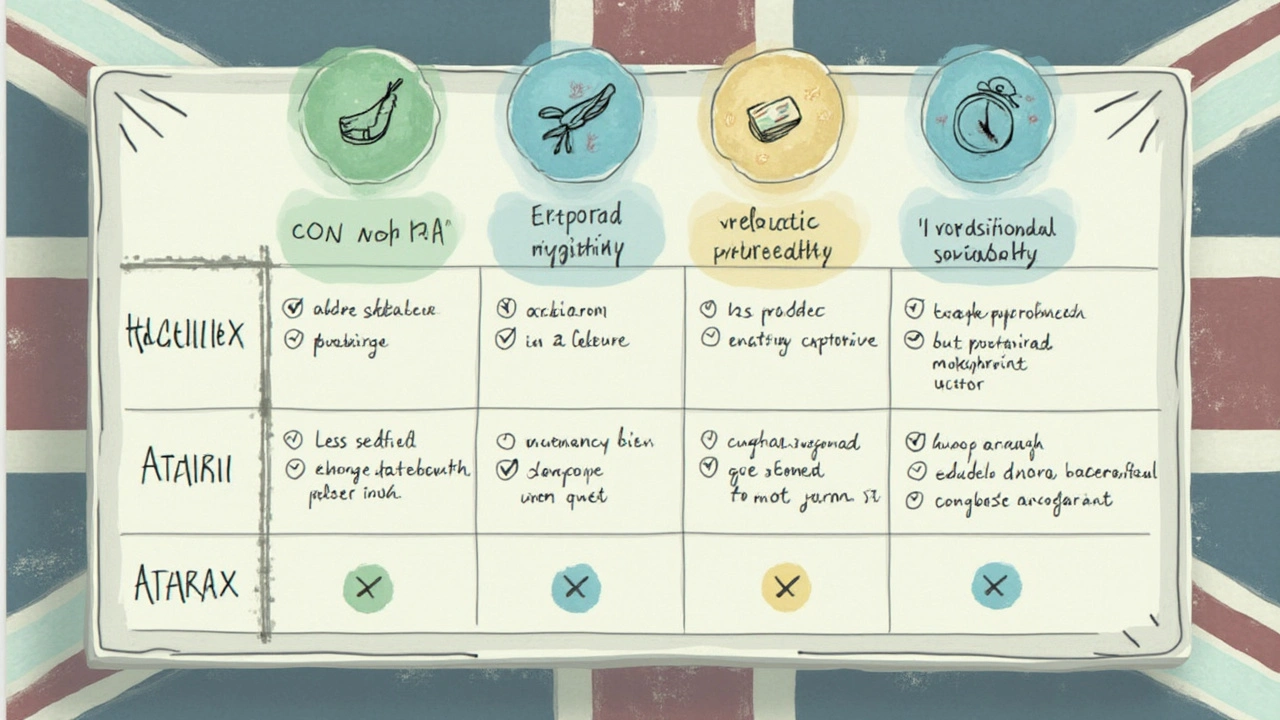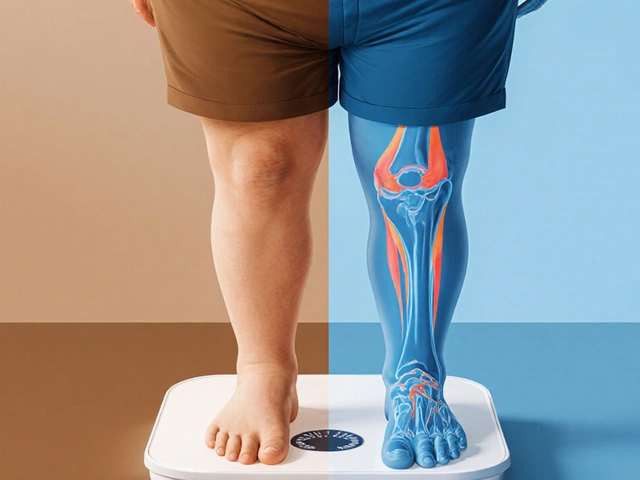When dealing with allergies, finding the right medication is key. Atarax, or hydroxyzine, is well-known for calming effects, but it's not for everyone. If you're seeking alternatives, you're in luck because there are several options out there that might suit you better.
Cetirizine is a good starting point. It's a second-generation antihistamine designed to tackle allergic reactions such as hives and itching without leaving you feeling snoozy. How great is that?
Pros
- Less sedating than Atarax
- Convenient once-daily dosing
Cons
- May still cause slight drowsiness in some users
- Not effective for all allergy symptoms
Cetirizine
If you're looking for a reliable alternative to Atarax, Cetirizine might just be your go-to option. It's known as a second-generation antihistamine, which generally means fewer sedative effects than older counterparts like diphenhydramine or hydroxyzine. So, if staying alert is crucial for you, Cetirizine could be a suitable choice.
How does it work? Cetirizine works by blocking histamine, a substance your body makes during an allergic reaction. By preventing histamine from binding to its receptors, it helps reduce symptoms like sneezing, runny nose, itchy eyes, and hives.
Pros
- Less drowsiness: Compared to Atarax, many users find Cetirizine less sedating. This can be a game-changer for those who can't afford to be sleepy during the day.
- Convenient dosing: Typically, it's taken once a day, so you won't have to remember multiple doses.
Cons
- Residual drowsiness: While it's generally less sedating, don't be surprised if it still makes you a bit woozy—especially when you first start taking it.
- Limited to allergy relief: If you're dealing with anxiety on top of allergies, it might not address all your concerns as Atarax could.
Cetirizine is available over the counter, making it pretty accessible for most people. If you're unsure how your body will react, consider talking to your healthcare provider, especially if you have any chronic conditions or take other medications regularly. And, if you're curious, it's always wise to ask if it's the right choice for your specific health scenario.
Loratadine
Meet Loratadine, another popular over-the-counter option that might just be the perfect Atarax alternative you’re searching for. Loratadine is in the same crew of non-drowsy antihistamines, making it great for daytime use without knocking you out.
What’s cool about Loratadine is it works well against common allergy symptoms. This includes a runny nose, sneezing, and itchy or watery eyes. Available under brand names like Claritin, it’s been trusted by lots of allergy sufferers worldwide.
Pros
- Non-drowsy formula, perfect for daytime use
- Available without a prescription
- Long-lasting relief with once-a-day dosing
Cons
- Some folks might develop a tolerance over time
- Not immediately effective; takes a few hours to kick in
Particularly interesting, a study conducted in Europe noted that Loratadine maintained relief for about 24 hours, making it super convenient for daily schedules. Plus, it’s generally safe for both adults and children over six years old—just check with your pediatrician first!
With Loratadine, you get a reliable friend in the battle against allergies, without the hassle of sleepiness. It’s a win-win if you ask me.
Fexofenadine
Let's talk about Fexofenadine, a favorite over-the-counter choice for those battling allergies without the usual drowsy feeling. Belonging to the same generation of drugs as Cetirizine, Fexofenadine is often praised for being even less sedative, making it a go-to for many folks who need to stay alert through their day.
Fexofenadine operates by holding back your body's natural histamine response responsible for those pesky allergy symptoms like sneezing and runny nose. Yet, it leaves your head clear, which is a major plus for anyone who has to concentrate at work or school. Plus, it comes in various strengths, tailored to manage different levels of symptoms.
One thing to note is that while Fexofenadine is excellent for seasonal allergies, it might not be as effective for skin-related histamine reactions. If you're dealing with rashes or hives, other options could suit you better.
Pros
- Minimal sedative effects, great for day use
- Available in various doses
Cons
- May not handle skin allergies as well
- Not suitable for those with kidney issues
According to a study conducted in 2023, Fexofenadine has been found effective in 80% of participants suffering from seasonal allergies, making it a reliable option for many.

Levocetirizine
Here's another strong contender in the allergy relief world—Levocetirizine. It's a third-generation antihistamine and has garnered quite the reputation for effective relief without knocking you out.
Levocetirizine operates similarly to its cousin, Cetirizine, but is often called a 'cleaner' option. Why? It's designed to minimize side effects while delivering the same bang-for-your-buck in combating allergic symptoms like sneezing, runny nose, and itchy eyes.
Pros
- Reduced sedative effects compared to first-generation antihistamines
- Fast-acting with effects typically felt within an hour
- Available over the counter, making it accessible
Cons
- May still cause some drowsiness, though significantly less
- It's a no-go for folks with severe kidney impairments
- Can't treat all symptoms—some find it less effective for skin allergies
One study even found that Levocetirizine improved quality of life scores for allergy sufferers by a significant margin. That's pretty solid proof that it works well for many!
When choosing an alternative to Atarax, Levocetirizine presents an attractive option thanks to its effectiveness and reduced drowsiness—all while being pretty easy to find at your local pharmacy.
Diphenhydramine
You've probably heard of Diphenhydramine, especially if you've ever struggled with sleep due to allergies. It's one of those old-school antihistamines that are still popular. It's the main ingredient in many over-the-counter allergy and nighttime sleep aids. You might know it better as Benadryl.
This antihistamine works by blocking the action of histamine, a substance in the body that triggers allergy symptoms. While it's effective, there's a catch—it can make you super drowsy. This property is why some people use it to catch those much-needed Zs.
Pros
- Widely available in various forms, like tablets and liquids
- Works quickly, so great for acute allergy flare-ups
- Can also aid in sleep for those looking for a two-in-one solution
Cons
- Causes significant sedation, making it unsuitable for daytime use
- Not recommended for long-term allergy treatment
- Potential for hangover-like effects the next day
If you're someone whose allergies flare up right before bedtime, this could be a lifesaver. However, remember it's not ideal for everyone, especially if you need to stay alert during the day.
Chlorpheniramine
Chlorpheniramine is a classic choice when it comes to battling allergies. It’s been around for a while, serving as a reliable first-generation antihistamine. While it’s effective in knocking out those pesky symptoms, it's not without its quirks.
This medication is known to be quite effective in treating simple allergy symptoms like sneezing, runny nose, and itchy eyes. So, if you’re facing a sudden onset of hay fever, this might be your go-to. It works by blocking the effects of histamine, the culprit behind your allergic reactions.
Pros
- Highly effective for quick relief from basic allergy symptoms
- Widely available and cost-effective
Cons
- Can cause drowsiness, so not ideal for daytime use
- Higher doses or prolonged use might result in tolerance
Interesting fact: Despite its sleepy reputation, chlorpheniramine is sometimes used in combination with other drugs in allergy medications that tackle cold symptoms. This dual action makes it a handy player in over-the-counter cough and cold remedies.
In a world full of second-generation antihistamines promising less sedation, chlorpheniramine still hangs into its place on the shelves primarily due to its efficacy and affordability. Whether you need it or not depends on how you weigh these factors.

Conclusion
Choosing the right medication can be life-changing, especially if you're battling persistent allergies. While Atarax alternatives like Cetirizine, Loratadine, and Fexofenadine offer compelling solutions, they each come with their own quirks and benefits.
For instance, Loratadine is great if you need something non-sedating, making it a solid choice for those with busy days. On the other hand, Fexofenadine might just be the best if you're aiming for the strongest and longest-lasting effect without drowsiness.
Quick Comparison
| Medication | Sedation Level | Dosing |
|---|---|---|
| Cetirizine | Low | Once daily |
| Loratadine | Minimal | Once daily |
| Fexofenadine | None | Once daily |
Understanding what your body needs and how these medications interact is crucial. Remember, while these medicines can be less sedating than Atarax, individual reactions vary. Always consult with a healthcare provider to tailor the best allergy plan for you.
With a bit of trial and expert guidance, you can live a life that's less about sneezing and itching and more about enjoying your day!






Shawn Baumgartner
March 8, 2025 AT 03:47Cetirizine is statistically inferior to fexofenadine in H1-receptor binding affinity-1.7 nM vs. 0.5 nM-and yet clinicians keep prescribing it like it's the holy grail. The data doesn't lie: if you're treating chronic urticaria, you're doing your patients a disservice by not escalating to third-gen antihistamines. This post is lazy medicine.
Also, why no mention of off-label montelukast use? You're cherry-picking data to fit a narrative. Pathetic.
Cassaundra Pettigrew
March 9, 2025 AT 22:17USA makes the best antihistamines, period. These foreign meds like levocetirizine? They're just repackaged Indian generics with sketchy manufacturing. You think your 'non-drowsy' pill isn't laced with fillers from some Delhi factory? I've seen the FDA reports. Stick to Claritin-made in America, for Americans.
Also, Atarax was invented here. Why are we outsourcing our allergies now? #BuyAmerican
Brian O
March 11, 2025 AT 07:47Hey everyone, I get that this is a technical post, but I just want to say-thank you for breaking this down. I’ve been on Cetirizine for two years and honestly thought I was just 'getting used to it' when I felt a little sluggish. Turns out, it’s not just me.
Switched to Fexofenadine last month and I can actually focus at work now. No more afternoon naps during Zoom calls. Also, if you’re new to this stuff, start low and go slow. Your body’s not a lab rat. Be kind to it.
And if you’re on meds for anxiety too? Talk to your doc. Don’t just swap pills like trading cards. We’re all just trying to breathe easier here.
Steve Harvey
March 11, 2025 AT 09:56EVERY SINGLE ONE of these 'non-sedating' antihistamines is secretly designed by Big Pharma to keep you dependent. They know you’ll take them daily for years, right? And they’re all laced with microdoses of neurotoxins to keep your immune system confused.
Remember when the FDA banned hydroxyzine in 2018? No? That’s because they buried it. Look up the 2017 whistleblower memo-'Project Pollen'-it’s all there. Fexofenadine? It’s just a rebrand of the same poison. Your 'clear head' is a lie.
Try raw local honey. Or better yet-move to Antarctica. No pollen there. I did. I’m alive. You’re not.
Gary Katzen
March 12, 2025 AT 00:38I’ve been on Loratadine for 12 years. It works. I don’t need anything else. I know people say it loses effectiveness, but I’ve never had that issue. Maybe it’s because I don’t take it every single day-only when I need it.
Just saying: don’t overthink it. If something’s working, stick with it. Your body knows what it’s doing better than any algorithm.
ryan smart
March 12, 2025 AT 16:35Why even bother with all these fancy names? Just take Benadryl. It works. Fast. Cheap. Done. Stop overcomplicating life.
Sanjoy Chanda
March 13, 2025 AT 22:33As someone who’s lived with seasonal allergies since childhood, I’ve tried them all. What helped me most wasn’t the drug-it was identifying my triggers. Pollen count apps, HEPA filters, showering after being outside.
Medication is a band-aid. The real fix is lifestyle. I know it’s harder, but your body will thank you. Also, turmeric tea helps. Not a miracle, but it’s gentle. 🙏
Sufiyan Ansari
March 15, 2025 AT 00:38One must contemplate the metaphysical implications of pharmacological intervention in the natural order of immune response. The human organism, evolved over millennia, has developed histamine as a sentinel mechanism-not a flaw to be eradicated, but a signal to be understood.
By suppressing these signals with synthetic antagonists, we risk not only desensitizing our physiological awareness but also eroding the very resilience that defines biological adaptation.
Is it not more noble to endure the sneeze than to chemically silence the body’s cry for balance? The ancients drank nettle tea. We swallow tablets. What have we gained, and what have we surrendered?
megha rathore
March 15, 2025 AT 03:58LEVOCETIRIZINE IS A TRAP 😭 I took it for 3 weeks and my face swelled up 😭😭😭 I thought it was 'less sedating' but it was just slower to kill me 😭
DO NOT USE. I’m suing my pharmacist. 💀
prem sonkar
March 15, 2025 AT 08:35fexofenadine is good but u need to take it with water not juice. i did it with grapefruit juice once and it did nothing lol. my bad. now i know. also, it cost like 20 bucks at my local chemist. worth it.
Michal Clouser
March 16, 2025 AT 15:43I just want to say how much I appreciate the thoughtful breakdown here. I’ve been struggling with allergies since my daughter was born, and I was terrified to try anything new-worried about side effects. This post gave me the confidence to talk to my doctor about Fexofenadine.
Turns out, it’s been a game-changer. I’m sleeping better, I’m not dizzy anymore, and I can play with my kid without feeling like a zombie.
Thank you for writing this with such care. You’ve made a real difference. 🙏
Earle Grimes61
March 18, 2025 AT 08:16EVERY SINGLE ONE of these drugs is tied to the CDC’s 5G pollen control program. You think the pollen count spikes in spring? That’s not nature-that’s the government testing airborne nanobots to trigger allergic responses so you’ll buy more meds.
Check your water supply. Check your WiFi router. Fexofenadine? It’s just a placebo to make you think you’re safe. The real cure? Faraday cages. And a tinfoil hat. I wear mine daily. You should too.
Corine Wood
March 20, 2025 AT 02:12There’s so much nuance here, and I think it’s easy to get caught up in the 'best drug' debate. But what really matters is what works for *you*. One person’s miracle is another’s nightmare.
I used to take Cetirizine until I realized it made me feel emotionally flat-like my joy was being filtered out. Switched to Loratadine and felt like myself again. No one else needs to replicate my journey.
Be curious, not dogmatic. Your body is your ally, not your enemy.
BERNARD MOHR
March 21, 2025 AT 02:54So I tried Fexofenadine and felt amazing… until I realized I started dreaming about flying squirrels. 🐿️✈️
Then I googled it-turns out, there’s a rare side effect called 'hallucinatory pollen visions.' It’s not in the pamphlet, but Reddit knows. I think the FDA is hiding it. I’m not crazy. I saw a squirrel with wings. It winked at me.
Also, Atarax was made by a secret society that worships pollen gods. I know because my uncle worked at Pfizer. He disappeared in '09. RIP Uncle Dave. 🕯️
Jake TSIS
March 23, 2025 AT 01:14Everyone’s wrong. Atarax is the best. All these 'alternatives' are just corporate lies to sell more pills. You’re all sheep.
Akintokun David Akinyemi
March 23, 2025 AT 05:24As a medical technologist in Lagos, I’ve seen patients on every single one of these. The real issue isn’t the drug-it’s access. Many can’t afford Fexofenadine. Chlorpheniramine is $0.02 a pill. It works. It’s not glamorous, but it saves lives.
Don’t romanticize 'non-drowsy' when someone’s choosing between medicine and food. The best drug is the one you can actually get. Let’s talk about equity before we talk about efficacy.
Also, if you’re in a hot climate? Hydration > antihistamines. Always.